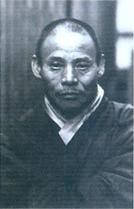Manhae
| Man-hae | |
|---|---|
| Born | July 12, 1879 Hongseong |
| Died | May 9, 1944 (aged 64) |
| Language | Korean |
| Nationality | South Korean |
| Citizenship | South Korean |
| Han Yong-un | |
 |
|
| Korean name | |
|---|---|
| Hangul | 한용운 |
| Hanja | 韓龍雲 |
| Revised Romanization | Han Yong-un |
| McCune–Reischauer | Han Yongun |
| Pen name | |
| Hangul | 만해 |
| Hanja | 萬海 also 卍海 |
| Revised Romanization | Manhae |
| McCune–Reischauer | Manhae |
| Birth name | |
| Hangul | 한유천 |
| Hanja | 韓裕天 |
| Revised Romanization | Han Yu-cheon |
| McCune–Reischauer | Han Yuch'ŏn |
| Courtesy name | |
| Hangul | 정옥 |
| Hanja | 貞玉 |
| Revised Romanization | Jeongok |
| McCune–Reischauer | Chŏngok |
| Dharma name | |
| Hangul | 한봉완 |
| Hanja | 奉玩 |
| Revised Romanization | Bongwan |
| McCune–Reischauer | Pongwan |
Han Yong-un (Korean: 한용운, July 12, 1879 – May 9, 1944) was a twentieth century Korean Buddhist reformer and poet. This name was his religious name, given by his meditation instructor in 1905, and Manhae (만해) was his pen name; his birth name was Han Yu-cheon.
Manhae was born in Yucheon in Chungcheongnam-do, Hongseong. During his childhood, he studied Chinese classics in Seodang, a popular elementary school during the Joseon Dynasty. Prior to being ordained, he was involved in resistance to Japanese influence in the country, which culminated in the Japanese occupation from 1905 to 1945. He lived in seclusion at Ose-am in the Baekdam Temple from 1896. During this period, he studied Buddhist sacred texts and several books of modern philosophy. In 1905 he received the robes of the Jogye Order of monks and in 1908 he went to Japan and visited several temples to study Buddhism and Eastern philosophy for six months. In 1919 he was one of the patriot signatories to the Korean Declaration of Independence.
As a social writer, Manhae called for the reform of Korean Buddhism.
Manhae's poetry dealt with both nationalism and sexual love, often mingling the two. One of his more political collections was Nimui Chimmuk (Lover's Silence, 님의 침묵), published in 1926. These works revolve around the ideas of equality and freedom and helped inspire the tendencies toward passive resistance and non-violence in the Korean independence movement.
In 1913, Han Yongun published "The Restoration of Korean Buddhism (Joseonbulgyo-yusimlon), which criticized the anachronistic isolationist policy of Joseon Buddhism and its incongruence with the then contemporary reality. The work sent tremors through the intellectual world. In this work, the author promulgated the principle of equality, self-discovery, the potential for Buddhism for safeguarding the world, and progress. His development as an activist and thinker resulted from his adherence to these very principles.
...
Wikipedia
